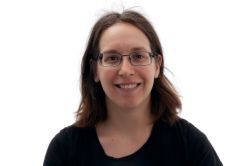Carrie Weidner
 Lecturer in Quantum Engineering, University of Bristol
Lecturer in Quantum Engineering, University of Bristol
What does it mean to be a woman in STEM?
I often find myself thinking about the giants upon whose shoulders I stand. That is, I think about the generations of women who faced such incredible barriers towards getting into the lab and doing experimental science. I honestly don’t think I would be here if those who came before me hadn’t bucked the norm and shown that women can be incredible scientists, just like men.
Why is gender equality important in STEM?
I think diversity in general is quite important, because the science shows that diverse teams work better. The diversity of thought and ideas that comes from bringing folks from different backgrounds together is invaluable when trying to do something ground-breaking.
What interested you in quantum?
I came to university wanting to study physics so I could work on nuclear fusion as a power source, but after I took my first quantum mechanics class, I was hooked on quantum. The mathematics and physics were just so elegant and cool. Then, when I realized I could play with some amazing toys in the lab (like lasers), I knew that I wanted to be a quantum physicist for the rest of my life, and I really never looked back, even if the road hasn’t been without its obstacles. I am constantly in awe that I make a living as a quantum physicist. This is the best job in the world.
What are you working on at the moment and what are the applications of this?
I’m currently working on two main experimental projects. The first, funded through QuantIC, is a magnetometer that works by studying how the interaction of light and hot atom vapour varies as a function of an applied magnetic field. We’re hoping to play some tricks with quantum mechanics and “squeeze” the precision of our device below the standard quantum limits set by the Heisenberg uncertainty principle.
In addition, we’re using optical cavities to make the light interact with the atoms as much as possible, which should make the magnetometer more sensitive. The device we’re building will hopefully guide future work in making compact and sensitive magnetometers, and my favourite application for this would be in bioimaging—looking at the magnetic fields created by the brain or heart of a living being. My second project is working on building sensors of acceleration and rotation with very cold atoms, which could be useful in situations where GPS isn’t available, like underwater. I like playing with atoms of varying temperatures—nature’s building blocks are also excellent quantum devices!
What are your hopes for the future and is there a particular application of quantum technologies that you are excited to see the development of in years to come?
Like most quantum physicists, I’m excited about seeing these technologies move out of the lab and into the real world. I’m particularly interested in the developments that will allow us to take a quantum system, something that is intrinsically quite fragile, and make it robust against all of the classical noise and decoherence that is so prevalent in the world. When we can do this, we will have unlocked the true potential of quantum technologies, enabling amazing quantum sensors, communication networks, and computers.
What transferrable skills do you think are the most important skills for a career in quantum?
I think a lot of people overlook the human side of things. Yes, you need to be interested in mathematics and physics, but so much of my job is based around talking to people, discussing ideas, presenting my work, or just generally networking. There’s a lot to be said for being someone who can convey an enthusiasm for amazing physics, along with ability to communicate complex ideas to a variety of audiences. Additionally, so much of what I do revolves around writing—that’s a critical skill to develop if you want to be an effective communicator. Communication is key because science is so collaborative; we have to work together to push the boundaries of what we know.
What advice would you give to young women, who hope to pursue a career in STEM, particularly in quantum?
Embrace a growth mindset—you can cultivate the skills you need to succeed. As much as you can, don’t let the naysayers get you down. Find a support network, and support others in their journeys. You can do this. Enjoy the ride!

